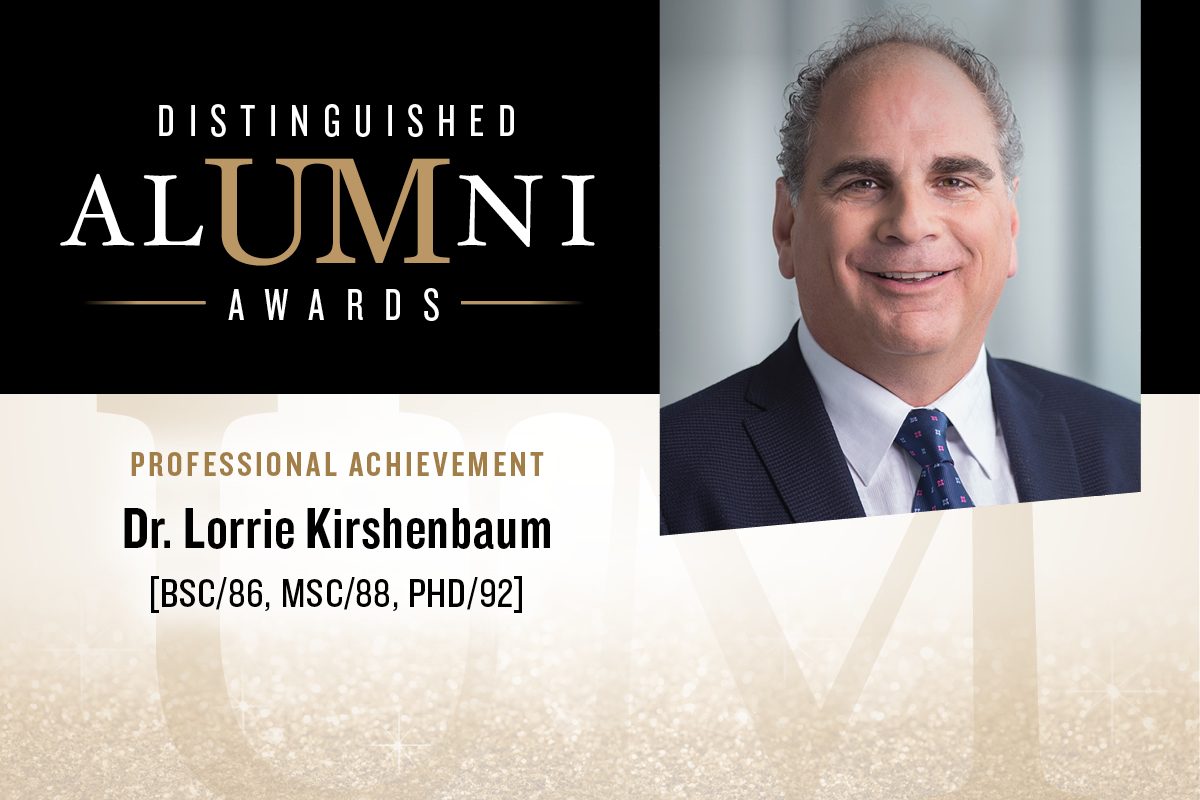
Lorrie Kirshenbaum: 2018 Distinguished Alumni Award Recipient for Professional Achievement
Cardiovascular pioneer
The recipients of the 2018 University of Manitoba Distinguished Alumni Awards are graduates who are outstanding in their professional and personal lives. These honourees encompass a wide range of achievement, innovation and community service and inspire fellow alumni, current students and the community.
Dr. Lorrie Kirshenbaum’s [BSc/86, MSc/88, PhD/92] research may sound like science fiction, but the advances he has made in human health are very real and the implications have had a global impact. His discovery that several of the world’s deadliest diseases – cancer, heart disease, vascular disease – can be treated by “switching off” select cells is a major leap forward in medicine.
In his own words…
As a kid I was always inquisitive. I was continually taking things apart and asking my teachers “why does it work like this?”
If you asked my mom to describe me she wouldn’t use the word intelligent or smart. She would say I was clever.
I was working in my dad’s electronics store when Dr. Harvey Weisman [BSc/52, MSc/55, PhD/70] came in with issues with his VCR or something. He didn’t say he was a professor of medicine, but started quizzing me on physiology. The following summer I worked in his research lab at the U of M, and the rest is history. To this day we have lunch at least once a week.
I spent a lot of time at UMSU, they had the bar upstairs. I liked campus life, and the learning environment provided a really good foundation for what I do now.
I’m fortunate that I’ve been trained in a way that allows me to see the trees for the forest.
Research is like doing a puzzle. The first thing is to find the corners, the low-lying-fruit experiments. Then you find one piece; it doesn’t fit, but you know it’s important. So you put it aside. Then later, once you’ve built more of the puzzle, you’ve got this area that’s open, and that one piece fits there. All of a sudden the rest fills in. Research is understanding what you have and knowing what areas to mine in next.
What we do is more of an art than a science. The science is the language.
The cool thing about what I do is I could come up with an idea in the middle of the night and test it the next day, to find out that it works. At that time, you’re the only one in the world who has that information.
When we published our first paper on gene therapy, we sat on it for a bit of time because we didn’t understand it. The field didn’t exist, so I was reluctant to stick my neck out because I wanted to be absolutely sure. My colleague says ‘do you want to be first or do you want to be right?’ I want to be right.
You could offer me a million dollars but that won’t solve heart disease. That won’t cure cancer. It’s the idea.
We stumbled into the cancer field because we immediately recognized the link. Heart disease and cancer, at the basic level, are very similar.
In the future someone will show up at the emergency room with heart attack symptoms and they’ll be given a drug. It’ll block this gene from being active, prevent whatever muscle hasn’t died yet, and keep them alive longer.
The whole industry of research is based upon being first. The biggest things are publications in high quality journals. To me, having a good team, making a difference and contributing in some way – is more important than the actual papers.
I tell my students if you meet me 50 per cent, I’ll help you. Because you have to really want to do it. This profession has really changed. It’s very difficult to get research dollars. But as long as you’re successful, and you try to be successful, you shouldn’t have a problem.
I’ll run into people who recognize me at the airport, at Costco, or at the gym. People here in Winnipeg know and appreciate what we do, and I don’t think you see that in Toronto.
I’ve had many offers to leave Winnipeg, but I’m committed. The original offer from the U of M, I thought I’d give it two years and see how it goes. Now it’s like 23 years later. What I’ve been able to build here is because the University provided it.
My wife would often say ‘you could be a big fish in a small pond,’ but I could be a big fish in a big pond too. I choose to be here because I want to be here.






